U4T1SB仁爱英语八年级上册
仁爱英语八年级第四单元u4t1笔记+比较级练习

仁爱英语⼋年级第四单元u4t1笔记+⽐较级练习⼀.重点词语考虑,认为think of 想起,认为think it over 仔细考虑in the countryside 在乡村享受⾃然的美景给某⼈快乐be important to sb. 对某⼈很重要share sth. with sb. 与……分享……为⾷(指动物) live on以……为⾷(指⼈类)cover…with… ⽤…覆盖the earth’s surface 在地球的表⾯(Thousands and) thousands of 成千上万make the air fresher 使空⽓更清新be necessary for 对……..很有必要plenty of ⼤量humans need water to drink, to cook and to clean⼈类需要喝的,煮的和洗的⽔In fact 事实上make up 组成,化装,和解most parts of the earth地球的⼤部分be important to 对…….很重要living things⽣物save every drop of water节约每⼀滴⽔not …at all ⼀点也不,根本不humans can’t live at all ______(没有)waterfill …with…⽤…填满…fill the hole _____ earth⽤泥⼟填满这个洞保证deep enough⾜够深keep it straight 保持它直不可数名词“越来越少”fewer and fewer+名词复数“越来越少”kill them for fur and bones 为⽑⽪和⾻头杀死它们⼆.重点句型1.The pig is much stronger than you. I’m the biggest of all2.I think roses are the most beautiful of all the flowers3.The rainforests are very important to us热带⾬林对我们很重要4.Water is necessary for all plants.It is the most important to all living things,we must save every drop of water.⽔对所有植物是必需的。
仁爱版八年级(上)英语知识点U1-U4T1知识点

U1 T1知识点
Unit1 Topic1
do
(干过.../ 或经常发生...)
A B
1. see sb
doing (正在干某事)
A:我看你暑假期间几乎每天都有打篮球。 I saw you play basketball almost every day during the summer holidays. B: 看! 你能看到她正在跳舞吗? Look! Can you see her dancing now? 反对: ~ him. A 2.against 靠着: ~ the wall. B A:我们都反对他。 We are all against him. B: 她正靠着墙站着。 She is standing against the wall.
4. build sb. up 增强某人的体质 我们要养成健康的饮食习惯来增强体质。 We should have healthy eating habits to build us up. 5. have fun doing sth. 从……中获得乐趣。 我从和朋友跑步中获得很大乐趣。 I have great fun running with my friends.
1. so that “为了,以便” I got up early so that I could catch the early bus.
so… that: 如此……以至于 他太小,还不能上学。 He is so young that he can’t go to school He is too young to go to school.
仁爱版八年级上册英语-Unit4:Topic1单词汇总+知识梳理
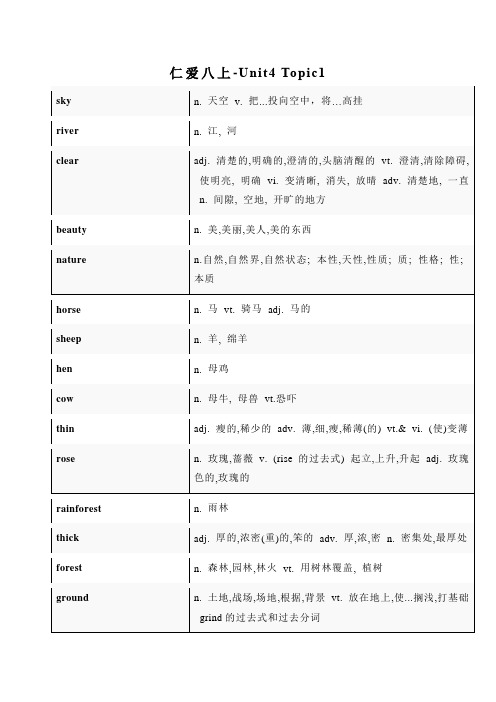
仁爱八上-Unit4 Topic1【重点短语】1.think about 思考,考虑2.the beauty of nature 自然美3.run after 追逐4.live a happy life 过着愉快的生活5.keep a pet dog 养宠物狗6.as we know 众所周知7.share sth. with sb. 与某人分享某物8.provide sth. for sb. = provide sb. with sth. 为某人提供某物9.nowhere else 没别的地方10.b e important to sb. 对某人很重要11.k eep sb./sth. doing sth. 让……一直做某事12.p lay an important part/role 扮演重要的角色13.d ie out 灭绝14.feed on (动物)以……为食15.live on (人类)以……为食16.in number 在数量方面17.be in danger 处于危险之中【重点句型】1.I think the countryside is much quieter than the city, too.我认为乡下也比城市更加安静。
2.I think the sheep are the nicest of all.我认为绵羊是最好的。
3.The pigs must be the fattest and laziest animals on the farm.猪一定是农场里面最胖最懒的动物。
4.What’s the strangest animal on the farm?在农场里面最强壮的动物是什么?5.But now, rain forests are becoming smaller and smaller.但是现在,雨林正在变得越来越少。
6.--Which do you like better, plants or animals?--I like animals better.--你比较喜欢植物还是动物?--我比较喜欢动物。
仁爱八年级英语上册精品课件U4T1SA

2b
Work alone
单音节及部分双音节形容词比较级(- er)和最高 级(- est)的规则变化。
Adjective
strong
tall
nice
brave
comparative stronger taller nicer braver
superlative strongest tallest nicest bravest
• 形容词比较级,最高级的规则变化 及用法。(-er/-est)
• 2. Talking about animals and describing nature.
Homework
• Draw a picture of your hometown and write a passage about it, using adjectives and their comparative and superlative degrees.
• 2 以e 结尾的单词去e加er/est: wide—wider—widest
• 3 以辅音字母加y结尾的单词,把y改成i, 再加er/est: busy—busier—busiest
• 4 以重读闭音节结尾,且末尾只有一个辅音字母的单 词,双写末尾的辅音字母,再加er/est : big—bigger—biggest (fat, thin, red, hot)
• What about Michael?
•Michael thinks it is __q_u__ie_t_e_r__, too.
And people can enjoy the beauties of nature there.
• Wang Wei goes there for his summer vacation every year.
仁爱八年级英语上册精品课件U4T1SB
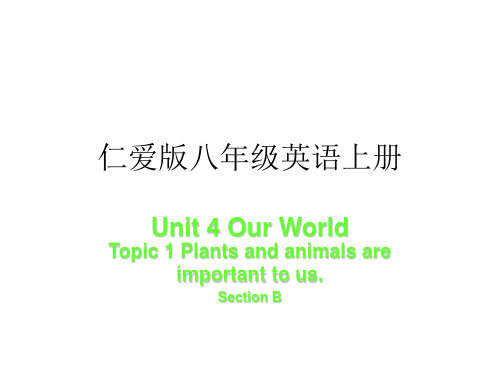
Most birds are _b__ig__g_e_r_ than most insects. Foxes are s__tr_o_n__g_e_rthan frogs. Snakes are _th__e_m__o_s__t_d_a_n__g_e_r_o_u_s_ of all. Insects feed on plants.
Learn some new words!
rpolasnetnn.玫. 植瑰物花
v. 种植,播种
Learn some new words!
fsf(riopnnoxlasg.)kennefc.o.tn狐x青n.e.狸蛇蛙s昆虫
• What’s the snake doing? • It is eating the frog. • It means snakes feed on frogs.
Key points
• We share the world with them.
share sth. with sb. 我和妹妹共用一个房间。
I share the room with my sister.
Key points
• Which do you like better, plants or animals?
Discuss with your partner what animals you like best. Then report your result.
1a
Look, listen and say
仁爱版英语八年级上册Unit 4 Topic 1 《 What's the strongest an
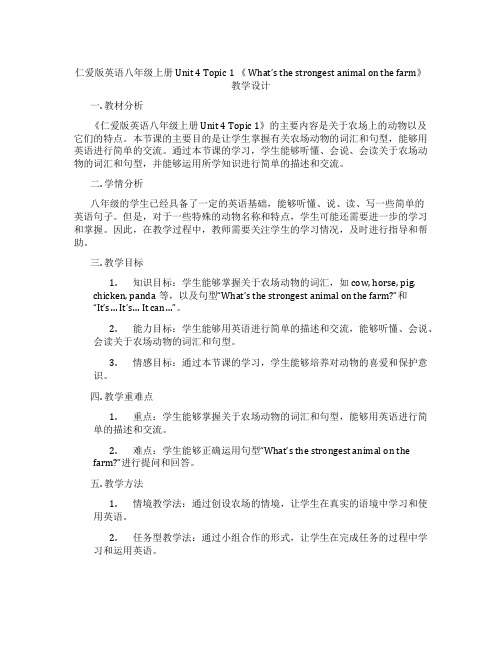
仁爱版英语八年级上册Unit 4 Topic 1 《What’s the strongest animal on the farm》教学设计一. 教材分析《仁爱版英语八年级上册Unit 4 Topic 1》的主要内容是关于农场上的动物以及它们的特点。
本节课的主要目的是让学生掌握有关农场动物的词汇和句型,能够用英语进行简单的交流。
通过本节课的学习,学生能够听懂、会说、会读关于农场动物的词汇和句型,并能够运用所学知识进行简单的描述和交流。
二. 学情分析八年级的学生已经具备了一定的英语基础,能够听懂、说、读、写一些简单的英语句子。
但是,对于一些特殊的动物名称和特点,学生可能还需要进一步的学习和掌握。
因此,在教学过程中,教师需要关注学生的学习情况,及时进行指导和帮助。
三. 教学目标1.知识目标:学生能够掌握关于农场动物的词汇,如cow, horse, pig,chicken, panda等,以及句型“What’s the strongest animal on the farm?”和“It’s… It’s… It can…”。
2.能力目标:学生能够用英语进行简单的描述和交流,能够听懂、会说、会读关于农场动物的词汇和句型。
3.情感目标:通过本节课的学习,学生能够培养对动物的喜爱和保护意识。
四. 教学重难点1.重点:学生能够掌握关于农场动物的词汇和句型,能够用英语进行简单的描述和交流。
2.难点:学生能够正确运用句型“What’s the strongest animal on thefarm?”进行提问和回答。
五. 教学方法1.情境教学法:通过创设农场的情境,让学生在真实的语境中学习和使用英语。
2.任务型教学法:通过小组合作的形式,让学生在完成任务的过程中学习和运用英语。
3.交际式教学法:通过师生互动和学生之间的互动,提高学生的英语交际能力。
六. 教学准备1.教学材料:教材、多媒体课件、图片、卡片等。
2.教学设备:投影仪、计算机、音响设备等。
初中英语 仁爱版八年级上册Unit4 Topic 1知识点

Unit4 Topic 1Section A1.think about=think of考虑,思考I have never thought of becoming a doctor.我从未考虑过要当一名医生。
think of还有“想起,想到,对...有想法”的意思,此时与think about意思不一样。
She often thinks of her friend.她常常想起她的朋友。
What do you think of the movie?你认为这部电影怎么样?2.countryside(名词)农村,乡下3.quieter than..:比...更安静。
比较级+than...:...比...更...,用于两个人或事物之间进行比较。
than后边的比较对象可以是一个词,一个短语或一个句子。
4.副词much修饰形容词的比较级,表示比较的程度。
可修饰比较级的副词还有a lot ...得多;a little一点儿,even更beauty of nature大自然的美5.单音节及部分双音节形容词比较级(- er)和最高级(- est)的规则变化:(1)一般在词尾直接加er/est: tall—taller—tallest(2)以e结尾的单词加r/st: wide—wider—widest(3)以辅音字母加y结尾的单词,把y改成i, 再加er/est : busy—busier—busiest (4)以重读闭音节结尾,且末尾只有一个辅音字母的单词,双写末尾的辅音字母,再加er/est :big—bigger—biggest (fat, thin, red, hot同理)音标中只有一个元音音素的是单音节词:dog,face,brush等。
音标中只包含两个元音音素的是双音节词:hello,tiny等。
音标中包含三个及三个以上的元音音素的是多音节词:vegetable,beautiful等。
6.三者或三者以上相比较,通常是用最高级:the+最高级+of/in/among+范围:某人(某物)在某范围内最...He is the tallest student in his class.他是他们这个班级里最高的学生。
仁爱版八年级英语上册Unit4Topic1

仁爱版八年级英语上册Unit4Topic1仁爱版八年级英语上册Unit 4 Topic 1 What's the strongest animal on the farm?. Section D 教学设计一、教学设计思路、指导依据说明1、本节课是仁爱版八年级英语上册Topic 1 What's the strongest animal on the farm?的最后一课,为阅读课型。
前三个section学习了动植物的一些词汇以及重点语法项目—形容词的比较级和最高级,本节课则是要求学生利用所学词汇和语法谈论﹑描述濒临灭绝的动物和人类生存的自然环境,有了前三个sections 的铺垫,学习本节课就迎刃而解了。
本节课的内容与世界现状联系紧密,很有现实意义,因此,本人在教学语言知识和语言技能的过程中,逐步渗透对学生们的情感教育,培养他们关爱自然界中的濒危动物,增强学生保护动物的意识,从而热爱我们的生存坏境的情怀。
2、根据《英语新课程标准》,本人主要运用任务型教学法及情景交际法,并采用多媒体课件进行教学。
按照任务型教学的基本理念,课堂任务的设计由浅入深选择贴近学生实际生活的内容,提供符合真实生活的学习情景,通过自主、合作、探究培养学生主动学习英语的兴趣、自学能力、合作能力。
二、教材背景分析1、教学内容分析本节课教学内容是仁爱版八年级英语上册Unit 4 T opic 1 Plants and animals are important to us 的Section D。
本节课以Animals in Danger为中心话题,使学生了解一些濒临灭绝的动物及它们的现状,让学生明白动物与人类生活的密切联系,培养学生保护动物和自然环境的意识,并使学生掌握一些动物名称及相关的词汇,学会谈论﹑描述濒临灭绝的动物和人类生存的自然环境。
2、教学对象分析本节课教授的对象为八年级的学生,他们大都比较喜爱动物,对有些动物也比较熟悉。
仁爱版八年级上册u4知识点

仁爱版八年级上册u4知识点仁爱版八年级上册u4是讲解“get to know me!”的。
这一单元是介绍自己的单元,也是让学生能够更好的理解如何与他人沟通交流的单元。
一、重点词汇1. introduction n. 介绍2. personal adj. 个人的3. identity n. 身份4. background n. 背景5. experience n. 经历6. personality n. 个性7. hobby n. 爱好8. preference n. 偏好9. involve v. 涉及10. share v. 分享11. interact v. 交流12. communicate v. 沟通二、句式表达1. What’s your name?你叫什么名字?2. Where are you from?你来自哪里?3. What do you look like?你是什么样子的?4. What do you like to do?你喜欢做什么?5. What’s your favorite subject?你最喜欢的科目是什么?6. What are your hobbies?你的爱好是什么?7. What are your pets?你养了哪些宠物?8. Do you involve in any after-school activities?你参加过任何课外活动吗?9. What’s your personality like?你的性格是怎样的?10. Do you have any siblings?你有兄弟姐妹吗?三、社交技巧1. 眼神交流当我们与他人沟通时,要保持眼神交流,表现出自信,利于建立良好的人际关系。
2. 姿态姿势是交流时的重要元素。
站姿、坐姿,都要有姿态,让别人对我们有好的印象。
3. 时时微笑微笑能给他人带来光明和温暖,可以让别人觉得和我们交往很舒适。
四、学习建议1. 提高口语能力在完成语言学习时,要加强口语方面的练习,提高句子连贯和表达准确度。
初中-英语-仁爱版-八年级上册-U4 T1 教案
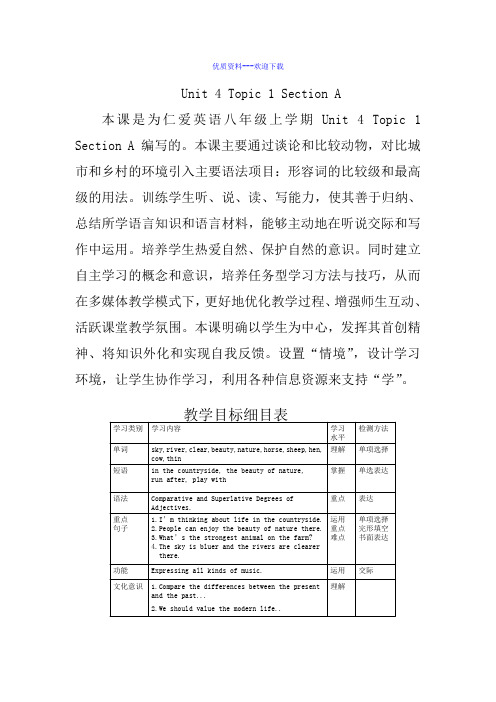
优质资料---欢迎下载Unit 4 Topic 1 Section A本课是为仁爱英语八年级上学期Unit 4 Topic 1 Section A 编写的。
本课主要通过谈论和比较动物,对比城市和乡村的环境引入主要语法项目:形容词的比较级和最高级的用法。
训练学生听、说、读、写能力,使其善于归纳、总结所学语言知识和语言材料,能够主动地在听说交际和写作中运用。
培养学生热爱自然、保护自然的意识。
同时建立自主学习的概念和意识,培养任务型学习方法与技巧,从而在多媒体教学模式下,更好地优化教学过程、增强师生互动、活跃课堂教学氛围。
本课明确以学生为中心,发挥其首创精神、将知识外化和实现自我反馈。
设置“情境”,设计学习环境,让学生协作学习,利用各种信息资源来支持“学”。
一、引——①看图对话引入生词。
②通过对话谈论动物生活的乡村,导入1a 。
③观看视频1a,初步理解对话。
二、学——听录音1a,完成1b与1c,引入主要语法项目:形容词比较级和最高级。
三、点——归纳总结形容词比较级和最高级的规则变化,先由学生自己总结变化规律,然后老师总结。
单音节及部分双音节形容词比较级(- er)和最高级(- est)的规则变化。
1. 一般在词尾直接加er/est: tall—taller—tallest2.以e 结尾的单词去e加er/est: wide—wider—widest3.以辅音字母加y结尾的单词,把y改成i, 再加 er/est :busy—busier—busiest以重读闭音节结尾,且末尾只有一个辅音字母的单词,双写末尾的辅音字母,再加er/est :big—bigger—biggest , (fat, thin, red, hot)②完成2b,检查学生对形容词的比较级和最高级的变化的掌握情况。
四、探——①听录音2a,完成对话填空。
②运用比较级和最高级谈论第3部分图片上的动物。
五、练——形容词比较级和最高级的练习。
short _______ _______ small ______ _______large _______ ________ late _______ _______ happy ______ ________ easy ________ _______ hot _______ ________ hard ________ _______ cute ________ ________ dirty ________ ______ 让学生两两做对话练习,并表演。
U4T1八上英语仁爱版重点单词

U4T1八上英语仁爱版重点单词Unit 4 Topic 1 (U4T1) 是八年级上学期英语课程中的一个重要主题。
在这个主题中,学生将学习和运用一些关键的单词来描述人物特征、外貌和个性,以及人际关系。
下面是U4T1 的重点单词。
1. appearance 出现;外貌- 形容词:appear 出现的;外貌上的- 例句:Her striking appearance made her stand out in the crowd.(她引人注目的外貌使她在人群中脱颖而出。
)2. personality 个性;人格- 形容词:personality 有个性的;鲜明的- 例句:John has a friendly personality and always gets along well with others.(约翰个性友好,总是能与他人相处融洽。
)3. responsible 负责任的;可靠的- 名词:responsibility 责任- 例句:As the class monitor, he is responsible for organizing class activities.(作为班长,他负责组织班级活动。
)4. confident 自信的;有信心的- 名词:confidence 自信- 例句:She is confident that she can win the competition.(她有信心能赢得比赛。
)5. patient 耐心的;有耐心的- 名词:patience 耐心- 例句:The teacher was patient and helped the student understand the difficult math problem.(老师很有耐心,帮助学生理解难题。
)6. polite 有礼貌的;客气的- 名词:politeness 有礼貌- 例句:It's important to be polite and say "please" and "thank you".(有礼貌地说“请”和“谢谢”是很重要的。
仁爱版英语八上U4T1SB

Most birds are _b__ig__g_e_r_ than most insects. Foxes are s__tr_o_n__g_e_rthan frogs. Snakes are _th__e_m__o_s__t_d_a_n__g_e_r_o_u_s_ of all. Insects feed on plants.
rpolasnetnn.玫. 植瑰物花
v. 种植,播种
Learn some new words!
fsf(riopnnoxlasg.)kennefc.o.tnake doing? • It is eating the frog. • It means snakes feed on frogs.
Birds and frogs eat insects. Snakes and foxes eat
birds or frogs. That’s _n_a_t_u_r_e__. That’s our world.
If there are no plants or insects in the future, what will our world be like?
Discuss with your partner what animals you like best. Then report your result.
1a
Look, listen and say
Answer the questions: 1. Does Wang Wei like animals? 2. What does Maria like?
仁爱英语 八年级上册 U4 T1知识点总结
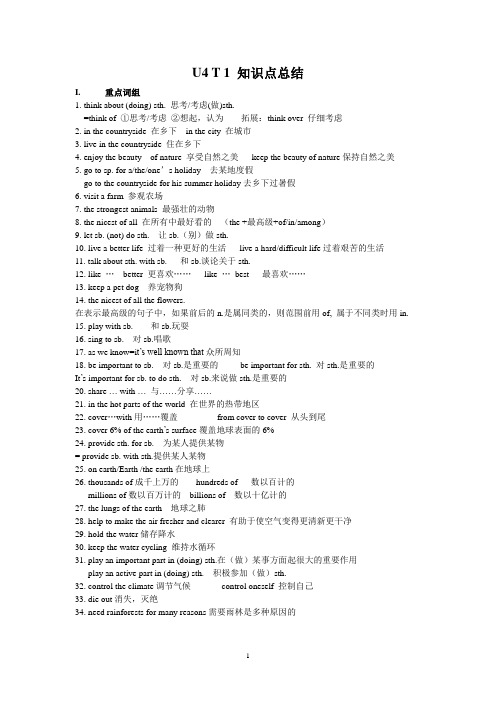
U4 T 1 知识点总结I.重点词组1. think about (doing) sth. 思考/考虑(做)sth.=think of ①思考/考虑②想起,认为拓展:think over 仔细考虑2. in the countryside 在乡下in the city 在城市3. live in the countryside 住在乡下4. enjoy the beauty of nature 享受自然之美keep the beauty of nature保持自然之美5. go to sp. for a/the/one’s holiday 去某地度假go to the countryside for his summer holiday去乡下过暑假6. visit a farm 参观农场7. the strongest animals 最强壮的动物8. the nicest of all 在所有中最好看的(the +最高级+of/in/among)9. let sb. (not) do sth. 让sb.(别)做sth.10. live a better life 过着一种更好的生活live a hard/difficult life过着艰苦的生活11. talk about sth. with sb. 和sb.谈论关于sth.12. like …better 更喜欢……like …best 最喜欢……13. keep a pet dog 养宠物狗14. the nicest of all the flowers.在表示最高级的句子中,如果前后的n.是属同类的,则范围前用of, 属于不同类时用in.15. play with sb. 和sb.玩耍16. sing to sb. 对sb.唱歌17. as we know=i t’s well known that众所周知18. be important to sb. 对sb.是重要的be important for sth. 对sth.是重要的It’s important for sb. to do sth. 对sb.来说做sth.是重要的20. share … with …与……分享……21. in the hot parts of the world 在世界的热带地区22. cover…with用……覆盖from cover to cover 从头到尾23. cover 6% of the earth’s surface覆盖地球表面的6%24. provide sth. for sb. 为某人提供某物= provide sb. with sth.提供某人某物25. on earth/Earth /the earth在地球上26. thousands of成千上万的hundreds of 数以百计的millions of数以百万计的billions of 数以十亿计的27. the lungs of the earth 地球之肺28. help to make the air fresher and clearer 有助于使空气变得更清新更干净29. hold the water储存降水30. keep the water cycling 维持水循环31. play an important part in (doing) sth.在(做)某事方面起很大的重要作用play an active part in (doing) sth. 积极参加(做)sth.32. control the climate调节气候control oneself 控制自己33. die out消失,灭绝34. need rainforests for many reasons需要雨林是多种原因的35. become smaller and smaller变得越来越小36. protect sb./sth. from (doing) sth.保护某人/某物免于(遭受)……的伤害37. feed on 以……为食38. in danger处在危险的状态中39. less and less越来越少40. land to live in生存的土地41. in Southwest China / in the southwest of China 在中国西南部southeast 东南northwest 西北northeast 东北42. become fewer in number数量越来越少43. the smallest sea animals最小的海洋动物44. the oldest type of tigers最古老的虎种45. the feature of………的特点II.重点句子1.I think the countryside is much quieter than the city, too.2.I go there for my summer holiday every day.3.I’m the strongest on this farm.4.Which do you like better, plants or animals?——I like animals better.5.Why do you think so?——Because animals are our friends. They make us happy.6.We share the same world with them.7.They provide places to live for thousands of plants and animals found nowhere else on Earth.8.They play an important part in controlling the climate.9.But now they have less and less land to live on.。
- 1、下载文档前请自行甄别文档内容的完整性,平台不提供额外的编辑、内容补充、找答案等附加服务。
- 2、"仅部分预览"的文档,不可在线预览部分如存在完整性等问题,可反馈申请退款(可完整预览的文档不适用该条件!)。
- 3、如文档侵犯您的权益,请联系客服反馈,我们会尽快为您处理(人工客服工作时间:9:00-18:30)。
Unit 4 Our WorldTopic 1 Plants and animals are important to us.Section BThe main activity is 1a. 本课重点活动是1a。
Ⅰ. Teaching aims and demands 教学目标1. Learn some new words and phrases:above, joy, rose, share … with …, snake, fox, frog, feed, feed on2. Learn some useful sentences:(1)They give us joy.(2)We share the same world with them.3. Go on learning comparative and superlative degrees of adjectives:(1) I think animals are more interesting.(2) I like plants better. I think roses are the most beautiful of all the flowers.(3) I like cats best because they are cuter than other animals.(4) Which kind of animal/plant do you like better, … or …?(5) Which kind of animal/plant do you like best, …, … or …?(6) Because they are the most interesting …4. Talk about nature and describe animals and plants:(1) Which do you like better, plants or animals?(2) I like animals better. I keep a pet dog. I think animals are more interesting.(3) I like birds. They are also beautiful, and they can sing to us.(4) Plants and animals are important to us.Ⅱ. Teaching aids 教具录音机/一束玫瑰花或玫瑰花的图片/小黑板Ⅲ. Five-finger Teaching Plan 五指教学方案Step 1 Review 第一步复习(时间:8分钟)通过复习动物名称,讨论喜好,导入本课新词。
1. (让学生分组比赛。
用英语描述学过的动物,调动他们学习的积极性,同时复习上节课所学的内容。
)T: Now, let’s play a game in groups of ten. If one student can say an animal’s name in Englishand describe it, he/she will get one score. For example, dogs. They’re the bravest on the farm. OK, begin.Ss: …(教师在黑板上记分。
)T: Stop! Group 3 has the highest score. So Group 3 is the winner.(教师给予表扬。
)2. (通过师生问答,引出生词和多音节形容词比较级,导入新课。
)T: From your talk, you seem to like animals, right?Ss: Yes.T: B ut I like plants better. Let me make a survey. Do you like plants or animals, S1?S1: I like animals. I think animals are more interesting. (帮助学生回答。
))T: Why do you think so?S1: Because animals are our friends. They can make us happy.T: Yes, they can give us joy.)What about you, S2?S2: I like plants better.T: Really? Do you like this kind of flower?(教师拿出一束玫瑰花或玫瑰花的图片。
)S2: Yes.T: What are they? Do you know how to say them in English?S2: They are roses. (教师帮助学生回答。
))T: Are they beautiful?Ss: Yes, they are.T: And I think roses are the most beautiful of all the flowers.的最高级形式。
)T: (对着S3) Do you like plants or animals?S3: Both animals and plants, because they are important to us.T: What about you, S4?S4: I like cats best, because they are more lovely than other animals.(板书,让学生观察lovely的比较级。
)T: I agree with the students above. So we must share the same world with plants and animals.Step 2 Presentation 第二步呈现(时间:5分钟)通过听录音和理解对话,让学生体会多音节形容词的比较级和最高级的变化规则。
1. (听1a录音,理解对话并回答问题。
)T: From your answers, I know some students like animals, and some students like plants. What do Wang Wei, Michael and Maria like? And why do they like them? Now listen to the tape, and then answer my questions:(核对答案。
)2. (再听1a,完成1b。
)T: Very good. Now let’s listen to 1a again and match the people with the things they like and their reasons in 1b.(核对答案。
)Step 3 Consolidation 第三步巩固(时间:12分钟)通过朗读,表演对话和对多音节形容词比较级及最高级的练习,使学生能灵活地运用多音节形容词比较级和最高级。
1. (学生先自读1a,然后听录音核对语音语调,注意关键词。
)T: Please read 1a by yourselves, then listen to the tape. Pay attention to the pronunciation, intonation and the key words.2. (分角色表演,训练学生的交际能力。
)T: Please role-play the dialog according to 1a. Then I’ll let some of you act it out in the front. (挑选几组学生到前面表演。
评出最佳表演组。
)3. (根据1b提供的单词和短语,复述课文内容。
)T: Boys and girls, let’s retell the dialog. You can begin like this: Wang Wei is talking about animals and plants. He says he likes plants better. He thinks roses …4. (对话练习,学会描述动物和植物。
练习形容词比较级和最高级句式,完成1c。
)(让学生看1c,先了解要操练的句型。
)T: In 1a, we know how to use comparative and superlative degrees of adjectives. Now let’s practice them. Please look at the sentence patterns in 1c.(一分钟后。
)T: OK, I want to ask two students to help me make up a new dialog with the expressions in 1c.Hi, S1, which kind of animal do you like better, dogs or birds?S1:Birds.T: Why do you think so?S1:Because they are more beautiful than other animals and they can sing to us.T: Quite well! Hi, S2, which kind of animal do you like best, dogs, birds or cats?S2:I like dogs best.T: Why do you think so ?S2:Because they are the most interesting of all the animals, and they are our friends. They can give us joy.T: Very good.(教师示范后,让学生两人一组进行练习。
练习时,学生可以站起来大声操练,使课堂气氛轻松、活跃、和谐。
)T: OK. Now please practice in pairs. You can use any word about plants and animals you have learnt and you can stand up to practice it loudly.(学生操练几分钟后。
